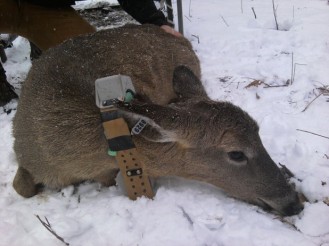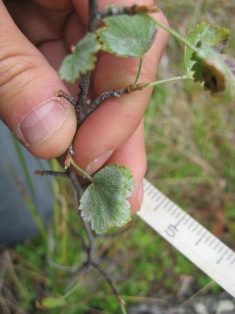I am an ecologist with a range of experience including predator-prey relationships, trophic cascades, occupancy and abundance estimation, and home range estimation.
My current research is investigating impacts of recolonizing wolves on deer behavior and vegetation.
I am passionate about increasing efficiency and reproducibility in ecology by applying machine learning to solve repetitive image analysis tasks. I am excited about involving students and local communities in my science research, resource management, and conservation efforts.

Are recolonizing wolves influencing deer behavior?
Our lab outfitted deer with collars containing go-pro style video cameras to watch their behavior and environment. These collars will allow us to investigate how recolonizing wolves may influence deer herd size, vigilance, foraging and other behaviors. Deer behavior internships are available during various dates/times to assist with analyzing the videos from these collars.
Can machine learning classify deer behavior?
I am applying machine learning to accelerometer data and animal-borne video to classify free-ranging deer behavior and environmental characteristics. I can then compare the model-predicted behavior to the “true” behavior (manually observed in the video), and assess the efficacy of using machine learning with accelerometers or animal-borne video to record deer behavior in rugged landscapes.

Testing trophic cascade theory in a complex environment
Some studies have shown that the presence of predators may cause prey species to be less sedentary. When deer or other large herbivores move around more, the herbivory is dispersed and vegetation does not get browsed heavily in one spot.
During the summer of 2015, I installed a number of exclosures in wolf-present and wolf-absent areas to see if recolonizing wolves in northeastern WA are causing a top-down trophic cascade. I am measuring canopy cover, plant heights, and species diversity to determine if wolf recolonization is impacting plant communities. Unlike studies conducted in National Parks, this research takes place in areas that also include hunting, logging, cattle grazing, and motorized outdoor recreation.
How is elk and vegetation management impacting songbird communities in Rocky Mountain National Park?
My masters research focused on trophic cascades due to over-grazing by elk (Cervus elaphus). In this project, I worked with Liba Pejchar at Colorado State University to evaluate the effects of elk management and willow restoration on bird communities in Rocky Mountain National Park, Colorado. I used program DISTANCE and the unmarked package in R to analyze bird abundance and occupancy in willow communities of various condition.